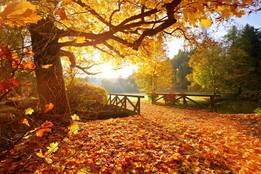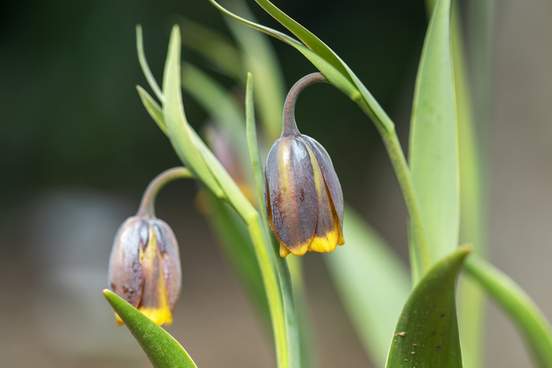
Stink Bell
: a fetid Californian herb (Fritillaria agrestis) common as a weed in grain fields
A rare plant with bell shaped flowers that is found only in California, the stink bell gets its name presumably because its blooms, well, they stink.
Cattle grazing has resumed at Contra Loma, with about a dozen cows wandering around on the northwest side of the park. According to park supervisor Janet Gomes, the grazing is used as a vegetation management technique to help propagate stinkbell, a low-growing native California plant.
— Ned Mackay, Contra Costa Times, 15 Dec. 2004
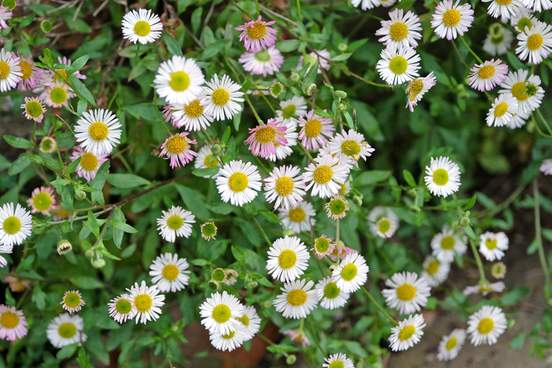
Fleabane
: any of various composite plants that were once believed to drive away fleas
If you have pets, fleas may be the bane of your existence because nobody likes a pest. And that is, perhaps, why fleabane would make an excellent insult. The common name for this flower is formed from combining flea (the small wingless bloodsucking insect) and bane, an obsolete word meaning (per the OED) "a slayer or murderer; one who causes the death or destruction of another." The flower is so named because it was once thought to repell fleas. (The meaning of bane that is "a source of harm or ruin" is related but came later.)
Despite the season, aromatic herbs still thrived and gave off delicious scents, and the plantings were mostly perennial ever-greens. …along the edges of the eaves, where they would catch the sun yet not get wet, there hung hundreds of little bunches of fleabane drying, just as at his father's house in Arpinum.
— Colleen McCullough, The First Man In Rome, 1991She swept the cottage's dirt floor, sprinkled it with water, and stamped it to keep it hard packed. She roasted the bacon and washed up the mugs and knives and sprinkled fleabane about to keep the fleas down.
— Karen Cushman, The Midwife's Apprentice, 1995
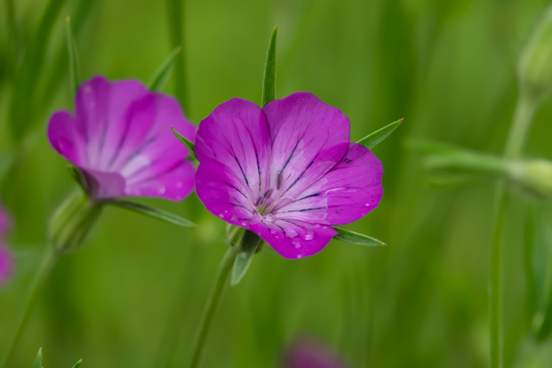
Corn Cockle
: an annual hairy weed (Agrostemma githago) of the pink family with purplish-red flowers that is found in grain fields
The corn cockle is a weed, which we define as "an obnoxious growth, thing, or person" and that, in addition to its ridiculous sounding name, makes it a fantastic insult for someone you do not like. The corn of corncockle is from the plant's presence in European corn fields. The cockle part comes ultimately from Vulgar Latin meaning "shell of a mollusk."
Corn cockle, which grows with winter wheat and makes bread taste bad when it gets ground up in flour, came from Russia. So did cheatgrass, the sticklike plant that takes over pastures and is not eaten by cows.
— Ian Frazier, The New Yorker, 6 Mar. 1989
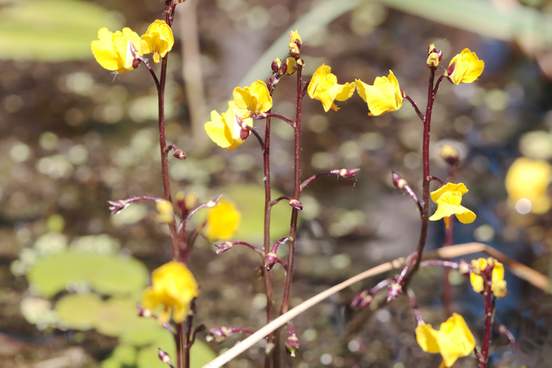
Bladderwort
: any of a genus (Utricularia of the family Lentibulariaceae, the bladderwort family) of chiefly aquatic plants having leaves with tiny saclike structures to trap small invertebrates
There's no two ways about it, bladderwort is as unpleasant sounding a plant name as it is a potential insult. We define a bladder as "a membranous sac in animals that serves as the receptacle of a liquid or contains gas" and also as "a gas- or air-filled vesicle in certain algae and aquatic plants." This second meaning is the one in the plant name. The wort in bladderwort is unrelated to the wart that refers to a viral growth on the extremities, and that is sometimes used to mean "one that suggests a wart especially in smallness, unpleasantness, or unattractiveness." This wort is actually related to the word root, but if you want to call someone unpleasant a bladderwort, we won't tell.
Sometimes a mosquito larva swims too close to a bladderwort, a kind of water plant. A trap-door on one of the plant's sacs quickly opens. Water rushes into the sac, carrying the larva with it. The trapdoor snaps shut. Then the larva is digested by the plant.
— Ranger Rick, July 1984
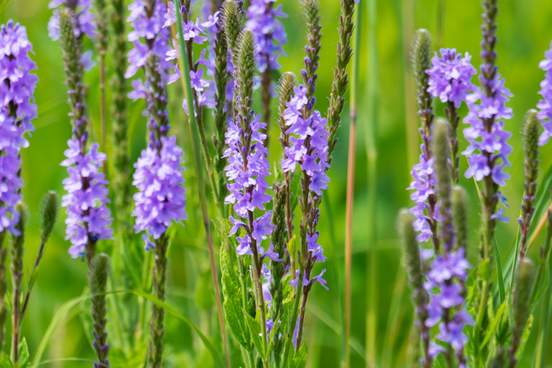
Hoary Vervain
: a densely white hairy perennial herb (Verbena stricta) of central North America with showy purplish blue spicate flowers
We're not saying you should use this term to insult someone. That's not very nice. We're just saying it sounds like an insult, for some reason.
Last summer, though, the knee-high prairie encircling a wide-canopied burr oak popped with pinks and purples. Prairie clover, hoary vervain and wild bergamot waved in the breeze among cereal grasses and dogwood saplings.
— Benjamin Fisher, Telegraph Herald (Dubuque, IA), 6 June 2024
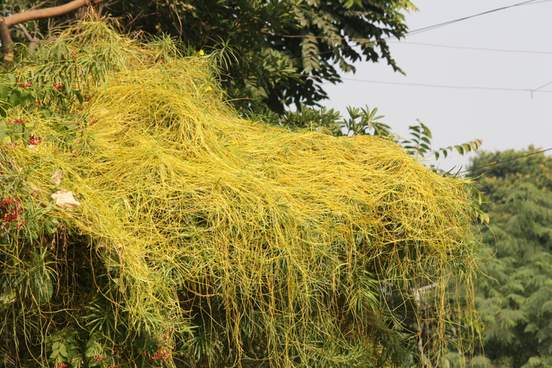
Dodder
: any of a genus (Cuscuta) of wiry twining vines of the morning-glory family that are highly deficient in chlorophyll, are parasitic on other plants, and have tiny scales instead of leaves
This isn’t the same word as dodder which means "to tremble or shake from weakness or age," but the parasitic and scaley dodder is actually related to an Old High German word meaning "egg yolk" probably from its appearance when overtaking another plant, and is related to morning glories. We think as an insult, it could have multiple shades of meaning.
The parasitic plant known as dodder really sucks. The vine (shown wrapped around a green stem) pierces the tissue of other plants, extracting water and nutrients. But it also consumes molecules that scientists could manipulate to design "attack RNA" that could interfere with dodder's growth and bring on its demise.
— Rachel Ehrenberg, Science News, 16 Aug. 2008
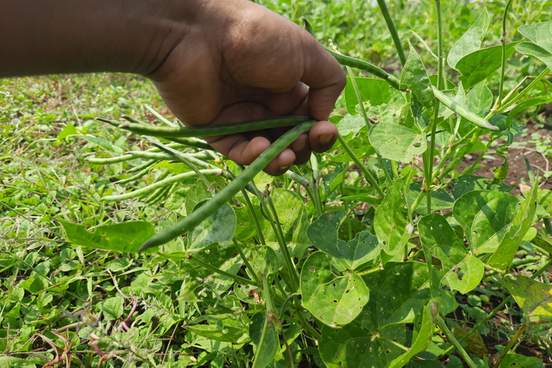
Cowpea
: a sprawling herb (Vigna unguiculata synonym V. sinensis) of the legume family related to the bean and widely cultivated in the southern U.S. for forage, green manure, and edible seeds
Cow is already an insult on its own (sense 3), but the pea really brings it up a notch. The "cow" in cowpea is because this plant is often grown to feed animals (such as cows). The cowpea is also called a field-pea or black-eyed pea, but the name cowpea makes a way better insult than either of those.
The cowpea, Vigna sinensis, is another old world type that is more bean-like than pea-like. Perhaps its original home was in central Africa…. It is now grown in the warmer areas of both hemispheres, largely to produce forage and seeds that are fed to animals.
— Frederick L. Fitzpatrick, OUR PLANT RESOURCES, 1964
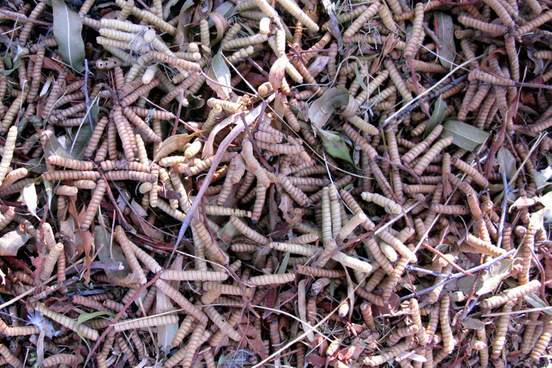
Screwbean
: a leguminous shrub or small tree (Prosopis pubescens) of the southwestern U.S. and northern Mexico having spirally twisted pods with sweet pulp
If it's not enough that screwbean sounds like an insult all on its own, please don't miss the fact that its scientific name is P. pubescens. The name actually comes from the fact that this shrub bears beans shaped like tightly coiled corkscrews.
The trail follows a section of China Ranch Creek, which is flanked by water-loving plants including screwbean and honey mesquite, seep willow, Goodding’s willow and Fremont cottonwoods.
— Deborah Wall, Las Vegas Review Journal, 22 Nov. 2020
